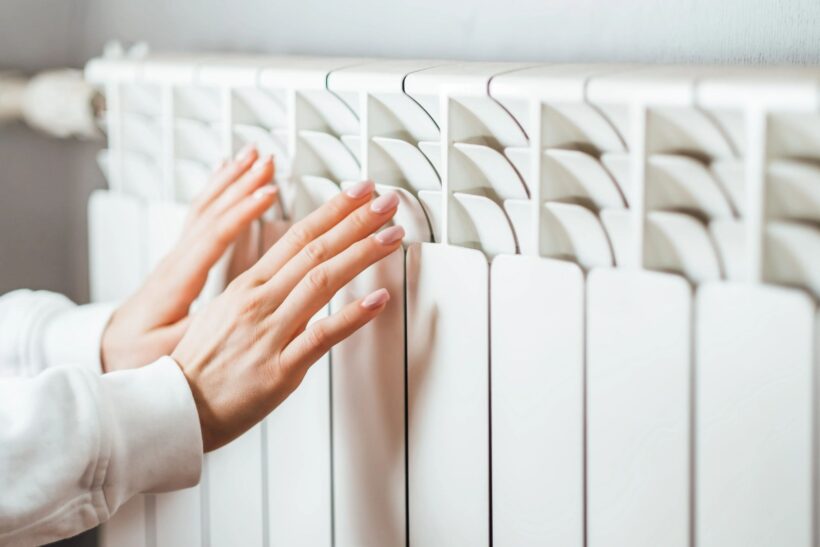AS the days get rainier and damper and temperatures begin to drop, many of us will have started turning on our heating.
It might be for an hour or two to stop our teeth from chattering as we work from home.
Or you might be leaving your heating on throughout the night as you sleep.
We all know nighttime is the chilliest – so changing into our pyjamas and climbing into a cold bed is never an appealing prospect.
But heating your home as you sleep might have some unintended effects on your kip and overall health.
Here are three health risks of snoozing with your central heating on.
Read more on winter health

7 budget hacks to save your lacklustre winter skin from shower tricks to gadgets

The 4 little-known signs your child is dangerously ill from damp and mould
1. It can disrupt your sleep
Sleeping with your heat cranked up can sometimes leave you too warm to drift off,or it can wake you up during the middle of the night.
Sleep consultant Maryanne Taylor, from The Sleep Works, told Sky News: "If the room is too hot, our body needs to work extra hard to regulate our body temperature during the night.
"This can increase wakefulness and reduce our time in deep, slow wave sleep, which is the all-important restorative sleep, enabling us to feel rested and energetic the next day."
According to the Sleep Foundation, the ideal temperature for your your room is around 15.6 to 20°C for a good night’s sleep.
Most read in Health

NHS will ‘eliminate cervical cancer by 2040’ as jab set to wipe out killer virus

More than 2m Brits at risk of sight loss because of condition, experts warn

Recall of popular toddler food over lead poisoning fears – the 7 signs to know

The 7 firm favourite ultra-processed foods ‘not linked to cancer or diabetes’
2. It make you more prone to colds
Your nostrils need snot to trap viruses floating around to stop you getting sick.
But cranking up your heat during the night can draw the moisture out of your schnoz, according to WebMD, making you more vulnerable to colds, the flu and sinus infections.
Your heating can also kick up clouds of dust, pollen and other allergens that can inflame your sinuses, it added.
Meanwhile, research from the Medical University of Warsaw found that "certain indoor heating methods are important risk factors for the occurrence of allergic rhinitis and asthma."
3. It can dry out your skin
On the subject of moisture, leaving your heating on can also dry out your skin.
Your heating-induced dry skin might mean you're more vulnerable to flare ups of conditions like psoriasis and eczema.
Dr Adam Friedmann, Consultant dermatologist for Stratum Dermatology Clinics, told Glamour: "Central heating adds an extra level of stress to managing dry skin, which is especially problematic when you have a pre-existing skin disease such as psoriasis or eczema.
"Warning signs that your skin might be too dry are if it feels rough to the touch, looks scaly or begins to flake."
Dermatologist Dr Hiba Injibar from Dermasurge Clinic added: "Making sure the heating is off during the night is an excellent way of easing skin dryness (especially if you have any skin conditions such as eczema or other inflammatory issues) as well as saving you a bit of money."
HOW TO STAY WARM DURING WINTER NIGHTS
All this is not to say that you shouldn't heat your home at all at nighttime – we all know how chilly houses can get once the sun goes down.
According to the British Heart Foundation (BHF), it's all about being strategic with the rooms you heat and the times you turn it on – especially if you want to save money on bills this winter.
For starters, try mostly heating the rooms you spend time in and turn off the radiators in rooms you aren't using.
As for keeping warm throughout the night, the BHF recommended turning on the heating in your room just before bed to make it nice and toasty.
But instead of keeping the heating on all night, it recommended using a hot water bottle or electric blanket to keep you cosy as you sleep.
The British Red Cross recommended piling on some extra blankets onto your bed, or buying flannel or fleece bedding if you can and they will keep the heat in better than cotton.
You could also try a weighted blanket, which won't let draughty air into your bed and can be very comforting.
Your pyjamas are also key, according to the Red Cross.
Fleecey or flannel pyjamas can again keep you warmer than cotton – and don't forget your bed socks to keep your feet warm.
The BHF added that wearing lots of layers rather than donning one thick one can keep you warmer.
Finally, getting rid of draughts is also key.
Try blocking off areas in your home that are particularly draughty, including around window frames and under doors, the BHF recommended.
You can line the windows with rubber seals or stick a homemade draught excluder in the crack under your door.
Read More on The Sun

Cheap Spanish beach town with most sunny days a year loved by Hollywood's A-list

Never use your dryer thanks to washing machine button people ALWAYS ignore
Keeping your our curtains open in the day to let light and warmth in, and drawing them before it gets dark to avoid losing heat can be helpful.
Putting rugs down can help insulate the floor, the Red Cross said.
Source: Read Full Article

